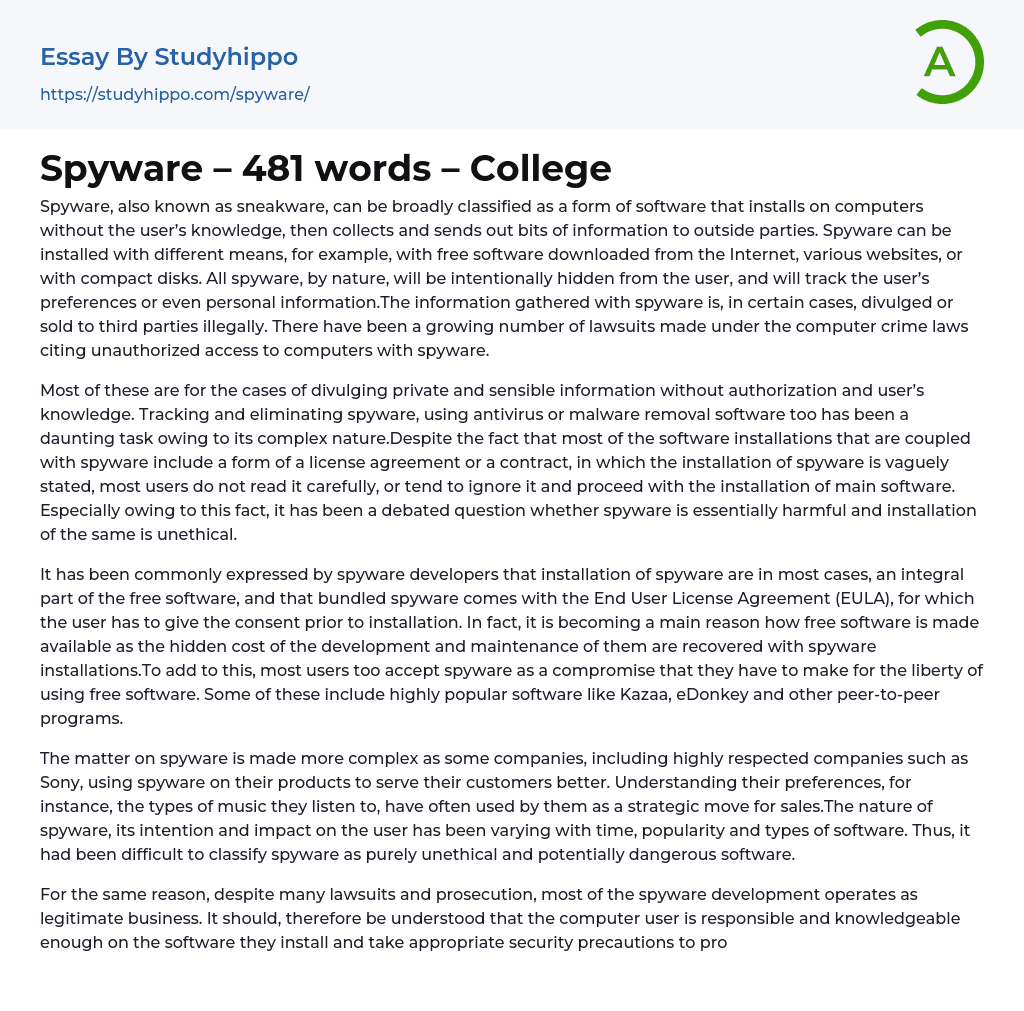Spyware, also known as sneakware, is a type of software that secretly enters computers and sends data to external sources. It can be installed in various ways, such as downloading free software online, visiting websites, or using CDs. Spyware remains hidden from users while monitoring their preferences and personal details. In certain instances, the data collected by spyware is unlawfully distributed or traded with third parties. This unauthorized computer intrusion has resulted in a rise in legal incidents under computer crime legislation.
There are many instances where private and sensitive information is revealed without the user's knowledge. The difficulty of tracking and removing spyware, as well as using antivirus or malware removal software, has created challenges. While most software installations with spyware have a license agreement or contract that vaguely mentions its installation, users often fa
...il to fully read it or simply ignore it and proceed with the main software installation. This situation has sparked a debate about the inherent harm of spyware and the ethical implications associated with its installation. Spyware developers commonly argue that bundled spyware is an essential part of free software and that users must give consent through the End User License Agreement (EULA) before installation.
The hidden cost of developing and maintaining free software is often recovered through spyware installations, making it a major factor in the availability of such software. Many users accept spyware as a compromise for the freedom of using free software, including popular programs like Kazaa and eDonkey. Spyware usage by companies, even respected ones like Sony, to better serve customers and understand their preferences has further complicated the issue. The nature, intentions, and impact of spyware o
users vary depending on time, popularity, and types of software, making it difficult to categorize as solely unethical or dangerous. As a result, despite lawsuits and prosecution, much of the spyware development operates as a legitimate business.
Computer users must assume responsibility for and possess knowledge about the software they install, as well as take essential security measures to protect their privacy and confidentiality.
- Professor essays
- Should College be Free essays
- Should college athletes be paid essays
- College Education essays
- College Tuition essays
- Graduation essays
- College Goals essays
- Personal Statement essays
- Online Classes Vs Traditional Classes essays
- Online Education essays
- Student Loan essays
- Study Abroad Scholarship essays
- Reasons To Go To College essays
- Paying College Athletes essays
- Technology In The Classroom essays
- Classroom essays
- College essays
- E-Learning essays
- Elementary School essays
- Examination essays
- Graduate School essays
- High School essays
- History Of Education essays
- Homeschooling essays
- Kindergarten essays
- Middle School essays
- Public School essays
- School essays
- Single Sex Schools essays
- Special Education essays
- Student essays
- Teacher essays
- University essays
- Vocational Education essays
- Android essays
- Application Software essays
- Benchmark essays
- Computer Network essays
- Computer Programming essays
- Computer Security essays
- Computer Software essays
- Cryptography essays
- Data collection essays
- Data Mining essays
- Graphic Design essays
- Information Systems essays
- Internet essays
- Network Security essays
- Website essays
- World Wide Web essays




